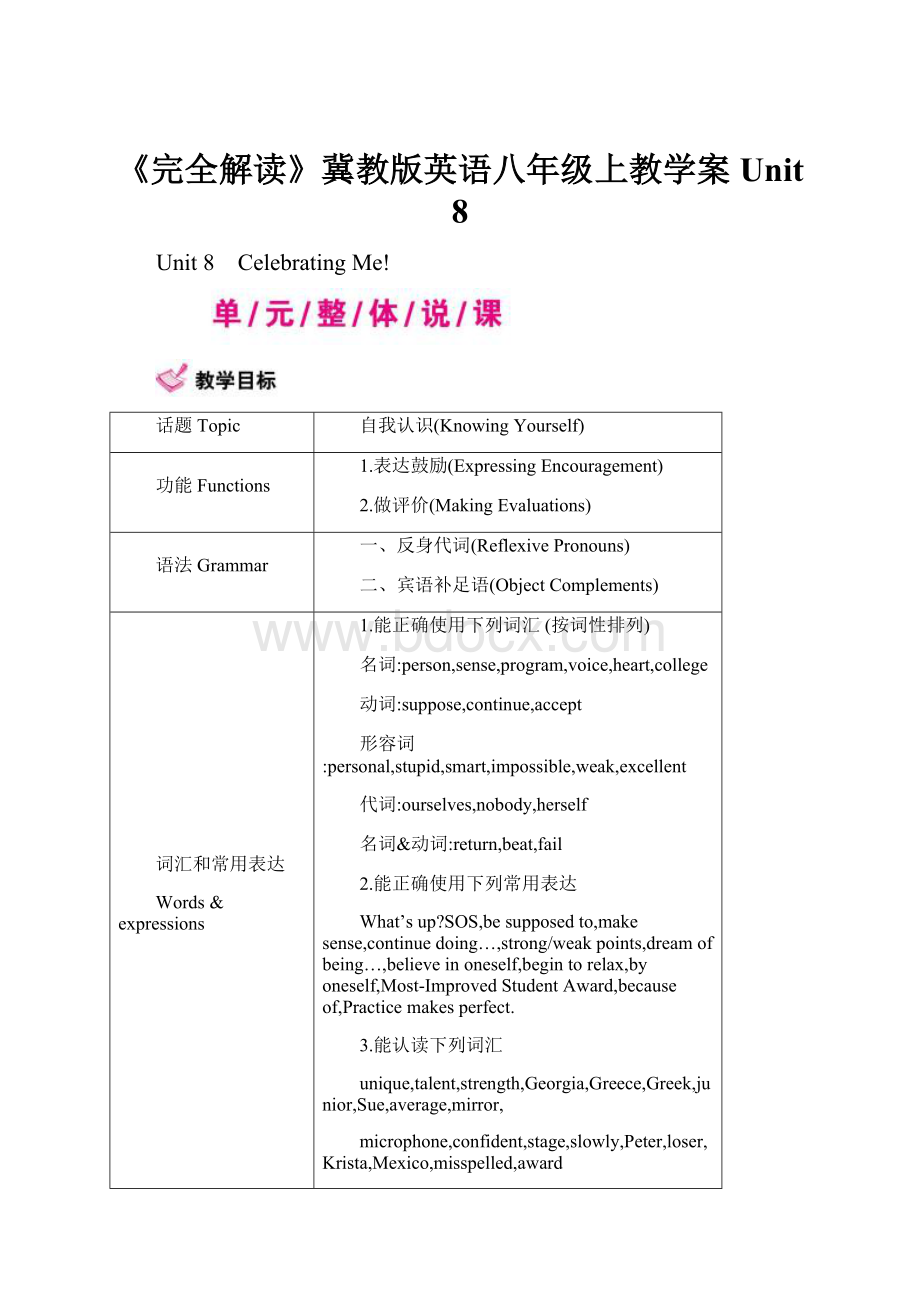《完全解读》冀教版英语八年级上教学案Unit8.docx
《《完全解读》冀教版英语八年级上教学案Unit8.docx》由会员分享,可在线阅读,更多相关《《完全解读》冀教版英语八年级上教学案Unit8.docx(84页珍藏版)》请在冰豆网上搜索。

《完全解读》冀教版英语八年级上教学案Unit8
Unit8 CelebratingMe!
话题Topic
自我认识(KnowingYourself)
功能Functions
1.表达鼓励(ExpressingEncouragement)
2.做评价(MakingEvaluations)
语法Grammar
一、反身代词(ReflexivePronouns)
二、宾语补足语(ObjectComplements)
词汇和常用表达
Words&expressions
1.能正确使用下列词汇(按词性排列)
名词:
person,sense,program,voice,heart,college
动词:
suppose,continue,accept
形容词:
personal,stupid,smart,impossible,weak,excellent
代词:
ourselves,nobody,herself
名词&动词:
return,beat,fail
2.能正确使用下列常用表达
What’sup?
SOS,besupposedto,makesense,continuedoing…,strong/weakpoints,dreamofbeing…,believeinoneself,begintorelax,byoneself,Most-ImprovedStudentAward,becauseof,Practicemakesperfect.
3.能认读下列词汇
unique,talent,strength,Georgia,Greece,Greek,junior,Sue,average,mirror,
microphone,confident,stage,slowly,Peter,loser,Krista,Mexico,misspelled,award
学习策略
Strategies
1.初步建立自主学习的概念和意识。
2.能使用简单工具书查找信息。
3.能总结所学语言材料中的语言规律并加以利用。
4.善于抓住用英语交际的机会。
文化知识Culture
1.拥有广泛的兴趣爱好。
2.认识电码求救信号SOS。
三维目标
Three-dimensional
target
知识与
技能
1.能掌握以下单词:
suppose,ourselves,person,personal,sense,nobody,return,
continue,stupid,smart,impossible,weak,program,voice,excellent,
heart,beat,herself,fail,accept,college。
2.熟练掌握本单元短语:
SOS,besupposedto,makesense,It’smypleasure.continuedoing…,strong/weakpoints,dreamofbeing…,believeinoneself,begintorelax,byoneself,Most-ImprovedStudentAward,becauseof
3.能掌握以下句型:
What’sup?
Practicemakesperfect.
It’smypleasure.
Iwashappytoseemyclassmatesaftersuchalongholiday.
Youplayedtheerhu,andIperformedadance.
Idon’tlikerain,either.
Thatway,hecouldspendmoretimeplayingbasketball.
IhadthepleasureoftalkingtoMary—agirlfromHongKong.
4.能了解以下语法:
(1)反身代词(ReflexivePronouns)
(2)宾语补足语(ObjectComplements)
三维目标
Three-dimensional
target
过程与
方法
1.利用课件来展开课堂教学,以pairwork的口语交际活动和groupwork小组探究活动来进行课堂教学和练习。
2.通过自主学习、合作探究、讨论练习,让学生学会介绍自己的个人特点。
情感态度
与价值观
1.在学习中,敢于用英语来表达自己的看法。
2.培养学习英语的兴趣和学好英语的信心。
3.乐于接触并了解异国文化。
4.培养学生对未来的一种积极的态度。
5.培养学生的自信心。
概述
本单元围绕“自我认识”这一话题展开教学。
课本先从李明和詹妮的对话开始,介绍了Georgia,Sue,Cathy,Peter,LiMing等的故事,通过让人不断地发现自己的特长与特点,从而更加自信。
学生学会介绍自己的个性特点,学会表示评价和鼓励的方法,学习反身代词和宾语补足语的用法。
第43课主要是讲Jenny鼓励李明发现自己身上的优点与特长,进而对自己产生信心。
第44课介绍了一个与众不同又为理想不断奋斗的女孩。
第45课通过书信的形式介绍了求助和答疑解惑及精神上支持。
第46课讲述了一个叫Cathy的女孩克服心理的畏惧勇敢地面对自己,成功站上舞台的故事。
第47课讲述了一个名为Peter的小男孩通过一点一滴的努力最后成功的故事。
第48课为一份报告,介绍了李明的个人情况。
接下来是复习课,通过练习对本单元的词汇、语法、口语交际进行了复习。
教学
目标
1.能够使学生掌握ourselves,continue,beat,accept等单词,besupposedto,makesense,continuedoing…,dreamofbeing…,believeinoneself等短语的用法。
2.能够让学生听懂有关评价和鼓励方面的语句,识别主题,获取信息。
3.能够使学生用词组和句型描写有关评价和鼓励方面的短文。
1.掌握反身代词和宾语补足语的用法。
2.能够运用所学词汇和句型介绍与评价和鼓励相关的内容。
教学突破:
课前,让学生搜集有关评价和鼓励方面的词汇,课上,以小组为单位汇报本组的情况,并用英语讨论相关信息。
注意方法与价值观的培养:
通过写信、报告、讨论等方式,介绍自己的优缺点,能够了解如何表达评
价和鼓励的句式。
本单元围绕“自我认识”展开话题,通过让学生不断地发现自己的特长与特点,从而更加自信。
第一课时:
Lesson43
第二课时:
Lesson44
第三课时:
Lesson45
第四课时:
Lesson46
第五课时:
Lesson47
第六课时:
Lesson48
教学
目标
单词
卡片
名词:
person,sense,program,voice,heart,college,talent,strength,mirror,
microphone,stage,loser,award
动词:
suppose,continue,accept
形容词:
personal,stupid,smart,impossible,weak,excellent,unique,confident
副词:
slowly
代词:
ourselves,nobody,herself
名词&动词:
return,beat,fail
形容词&名词:
Greek,junior,average
其他:
Georgia,Greece,Sue,Peter,Krista,Mexico,misspelled
教学
目标
短语
归纳
SOS,besupposedto,makesense,continuedoing…,strong/weakpoints,dreamofbeing…,believeinoneself,begintorelax,byoneself,Most-ImprovedStudentAward,becauseof
句型
集锦
1.What’sup?
2.Practicemakesperfect.
3.Iwashappytoseemyclassmatesaftersuchalongholiday.
4.Youplayedtheerhu,andIperformedadance.
5.Idon’tlikerain,either.
6.Thatway,hecouldspendmoretimeplayingbasketball.
7.IhadthepleasureoftalkingtoMary-agirlfromHongKong.
8.It’smypleasure.
重点
语法
一、反身代词(ReflexivePronouns)
二、宾语补足语(ObjectComplements)
Knowingaboutyourselfnotonlymeansfindingoutwhatyou’regoodatandwhatyoulike,butalsomeansdiscoveringwhatyou’renotgoodatandwhatyoudon’tlike.Bothhelpyoutoseeyouraiminlife.
Althoughmoststudentswouldbeunhappyiftheyfailedaverydifficultphysicsexamination,theyhaveinfactlearnedalotaboutthemselves.Theyknowthattheyshouldnotbecomeengineersorphysicalscientists.Sofailingcanhelpastudenttoliveahappierlifeifhelearnssomethingfromit.Theymaythendecideontheiraimsandchoosetheworktheylikeandarefitfor.
Itisimpossibletodecidewhetheryoulikesomethinguntilyouhavetriedit.Ifyoudecidetoplaythepiano,youneedtotakemorethanonelessonbeforeknowingwhetheryouarereallyinterestedinitorabletodowell.Itisnotenoughifyouwanttobeagreatpianist.Youalsohavetolikethehardpracticeandlongtraining.Ifyouenjoybeingagreatpianistbuthatethework,forgetit.
It’sagoodplantotryasmanyideasaspossiblewhenyouareyoung.Thenyouwillfindoutwhatyourtrueinterestsare.
第一课时 Lesson43:
WhatMakesYouUnique?
1.记忆单词suppose,ourselves,person,personal,sense 短语及句式What’sup?
SOS,besupposedto,makesense,It’smypleasure.。
2.通过学习,让学生了解如何询问对方的个人特点及回答。
3.利用课件来展开课堂教学,以pairwork的口语交际活动和groupwork小组探究活动来进行课堂教学和练习。
4.通过本节课的学习,学生能够根据实际情况正确地评价自己,了解了自己的长处和独特之处,树立起对自己的信心。
1.掌握词汇suppose,ourselves,person,personal,sense,接触词汇unique,talent,strength,学习短语及句式What’sup?
SOS,besupposedto,makesense,It’smypleasure.等。
2.重要句子:
What’sup?
SOS!
Wearesupposedtodescribeourselvesinareport.Yes,thatmakessense.It’smypleasure.
3.反身代词和宾语从句。
1.初步掌握反身代词的用法。
2.运用所学知识介绍自己的个人特点。
本课的教学内容是第八单元的第一课时,主要涉及个人特点的介绍。
本课通过小组活动、讨论,利用多媒体进行探究式教学,调动学生的主动性、积极性,培养合作意识和探究能力,由点到面、循序渐进,让学生在轻松、活跃的气氛中得到听、说、读、写技能的培养及提高。
课件PPT,录音机
StepⅠ.Leadin
Leadingin【情景1】
TheteachershowssomepicturesonthePPT.
T:
Theyarethepersonsin“WhereAreWeGoing,Dad?
”.Theyshowtheirpersonalstrengths,andweallknowthemnow.Theyareunique,aren’tthey?
Ss:
Yes.
T:
Whodoyoulikebest?
Why?
Ss:
…
T:
Whatareyougoodat?
Areyouproudofyourself?
Discussthequestionsingroups.Thenletsomestudentscometothefrontandsharetheirideaswiththeothers.
[设计意图] 由《爸爸去哪儿》中学生们很感兴趣的孩子的图片导入,可以提高学生们的兴趣,便于对生词与短语的理解。
Leadingin【情景2】
T:
InUnit8youwilltalkalotaboutyourownpersonaltalents,strengthsandweaknesses.Atalentisaspecialskill.Canyougivemeanexampleofatalent?
Ss:
Drawing./Dancing./Singing./Writing./…
T:
Oneofmystrengthsiswriting.Iamgoodatwriting.
S1:
Iamgoodatsports.Mystrengthissports.
S2:
Iamnotgoodatdancing.Myweaknessisdancing.
T:
Areyouproudofyourself?
Whatareyouproudof?
Ss:
Yes.IamgoodatEnglish./Iamgoodatsinging./…
T:
Welldone!
LiMingandJennyarechattingonline.Whataretheytalkingabout?
Let’sread.
[设计意图] 激发学生的兴趣,让学生学习介绍自己的个人特点,引出本课的话题。
StepⅡ.Listening
1.PlaythetapeforLesson43twice.Studentslistentothedialogueandchoosethecorrectones.
(1)Whoneedshelp?
A.LiMing.
B.Jenny.
C.Afriend.
(2)What’shisproblem?
A.Helosthisbicyclelastweek.
B.Hewaslateforschoolagain.
C.HeneedshelpwithhisEnglishprojectthisweek.
(3)HowdoesLiMinglikethereport?
A.Hefindsitalittlehard.
B.Heisproudofit.
C.Noproblem.
(4)WhatdoesJennytellLiMingtowriteabout?
A.Specialtalentsandpersonalstrengths.
B.Ageandheight.
C.Friendsandteachers.
Checktheanswerseachother.
【Keys】
(1)A
(2)C (3)A (4)A
2.PlaythetapeforLesson43againandaskthestudentstocompleteExercise2in“Let’sDoIt!
”.
[设计意图] 培养学生良好的听力习惯,需要教师教会学习英语的方法。
在学生听力练习时,听前预测是很重要的听力策略,要养成先听、后看,先整体、后细节的习惯。
StepⅢ.Reading
1.Thestudentsreadthetextbythemselves.Givethestudentsseveralminutestorememberthedialogue,andthenletstudentsrole-playthedialogue.Findoutthemainphrasesandsentencesinthedialogue.
2.AskstudentstoreadthelessonandfinishExercise1of“Let’sDoIt!
”.
[设计意图] 全面而系统地理解课文,中间穿插小组的PK竞赛活动。
3.Thefollowinglanguagepointsshouldbeexplained.
☆教材解读☆
1.What’sup?
What’sup?
用于口语,意为“怎么了?
有什么事?
近来怎么样?
”。
Hi,Tony.What’sup?
你好,托尼。
近来怎么样?
【拓展】 类似用法还有:
What’swrongwithyou?
What’sthematter/troublewithyou?
What’shappenedtoyou?
等,都可以意为“怎么回事?
有什么事?
”。
2.Noproblem!
◆Noproblem.用于口语,意为“没问题”,表示对对方的请求作出的积极而肯定的答复。
—Pleasehelpmemovethedesk.
请帮我移动一下书桌。
—Noproblem.没问题。
◆problem为可数名词,意为“问题,难题”。
Pollutionbringsalotofproblems.污染带来了许多问题。
Theproblemisthepriceoftheticket.问题是票价(太贵了)。
3.Wearesupposedtodescribeourselvesinareport.
besupposedto意为“应该”,相当于should,表示建议、义务或责任等。
besupposedto的时态、人称和数的变化在be动词上体现,to为不定式符号,后面接动词原形。
Youaresupposedtowritetoherassoonaspossible.你应该尽快给她写信。
【拓展】 besupposedto的否定形式为benotsupposedto,相当于shouldnot,意为“不应该”。
Middleschoolstudentsarenotsupposedtousemobilephones.中学生不应该使用手机。
Youarenotsupposedtosmokeintheroom.你不应该在房间里抽烟。
4.Ifinditalittlehard.
“find+名词/代词+形容词”为固定结构,句中it作宾语,hard作宾语补足语。
Thechildrenfoundthebookveryinteresting.孩子们发现那本书很有趣。
5.Yes,thatmakessense.
makesense意为“有意义,有道理”。
Iguessthatmakessense.我想那蛮有道理。
Itmakessensetocareforyourhealth.保重身体是明智的。
6.It’smypleasure.
It’smypleasure.也常写作Mypleasure.,意为“不客气;不用谢”,是对别人表示感谢时的一种应答语。
—Thanksalotforyourkindhelp.非常感谢你的热心帮助。
—It’smypleasure.不客气。
【拓展】 withpleasure.意为“当然了,很愿意”,表示愿意提供帮助或乐于参与。
—Willyoujoinus?
你愿意和我们一起吗?
—Thankyou,withpleasure.
谢谢,非常愿意。
StepⅣ.Practice
Ⅰ.根据汉语提示完成句子
1.Weare (应该)todescribe (我们自己).
2.I’magoodstudent,andIthinkI’magood (人).
3.Youcanalsowriteaboutyourspecial (才能)and (个人的长处).
4.Whatmakesyou (独特的)?
5.Yes,thatmakes (意义).
Ⅱ.用方框中所给词的适当形式补全短文
ourselves person talent suppose personal
Weareunique.Each 6 hashisownspecial 7 and 8 strengths.Someofusaregoodatdrawing;othersaretalentedatsinging.Butitdoesn’tmatter.Weshouldbeconfident.Itmakessense.I 9 wewillbeproudof 10 inthefuture.
Ⅲ.